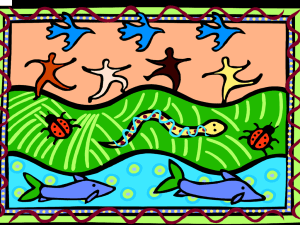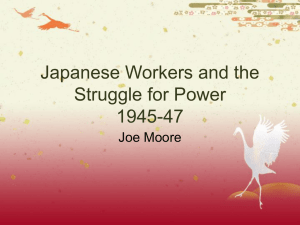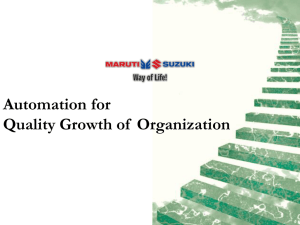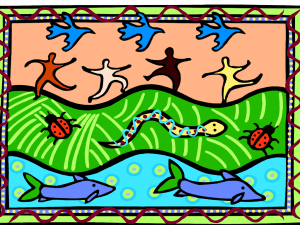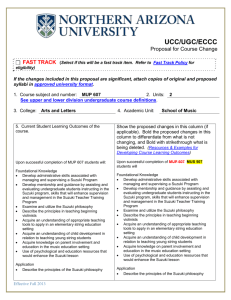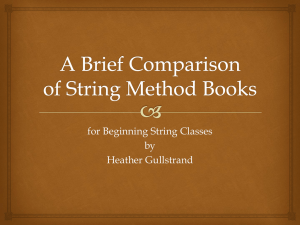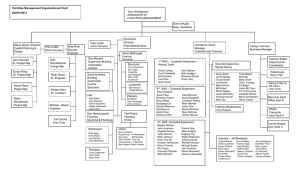ppt
advertisement
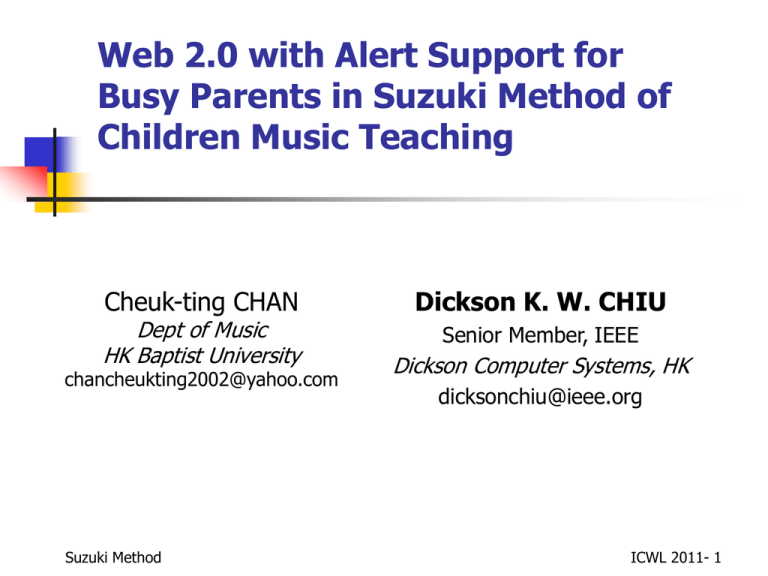
Web 2.0 with Alert Support for Busy Parents in Suzuki Method of Children Music Teaching Cheuk-ting CHAN Dept of Music HK Baptist University chancheukting2002@yahoo.com Suzuki Method Dickson K. W. CHIU Senior Member, IEEE Dickson Computer Systems, HK dicksonchiu@ieee.org ICWL 2011- 1 Introduction Suzuki method for children learning musical instruments Key requirements well received and practised worldwide developed and expanded for various kinds of instruments Parental involvement and learning environment Become obstacle for busy parents in metropolises Solution: Web 2.0 with Alert Support for Suzuki method Platform (WASSAP) provides a virtual musical environment for teachers, students, parents Alert Management System (AMS) to facilitate their communications Enabling ICT infrastructure: high computing penetration, high-bandwidth broadband and wireless infrastructure. Suzuki Method ICWL 2011- 2 Philosophy of Suzuki method All children have potential to become musical Applying “Mother tongue” method to children’s music learning. Environment rather than genetics will determine the success and failure of students. Suzuki Method ICWL 2011- 3 Curriculum of Suzuki Method Careful and sequential planning of curriculum Breaking each new skill into the smallest possible steps Avoiding dry technical exercises New technical skills and musical concepts introduced and disguised with the context of familiar musical pieces Interesting and attractive to the children and their families. Motivation for learning comes from the desire to learn new pieces in the repertoire. Suzuki Method ICWL 2011- 4 Technical concepts of Suzuki method Begin lessons early Suzuki Triangle: strong partnership among student, teacher, and parent Daily listening to recordings Learning by ear before reading music notations Like learning mother-tongue One-point learning - focus on only 1 technique at a time Individual lessons at each child’s own pace Use group classes to review the materials presented in the private lesson and to introduce the skill of playing together. Suzuki Method ICWL 2011- 5 Parent’s role suggested by Suzuki To cooperate with the music instructors Give positive encouragement to their children Attend child’s lesson Learn to play the instrument even before the child understand what the child is expected to do. Foster the musical environment by attending concerts and playing recordings at home Suzuki Method ICWL 2011- 6 Review of the role of parents in children’s music learning in Hong Kong Observation based on the authors’ experience teaching music in school instrumental tutor conversation with parents. Little involvement of parents in their children’s learning. Parents are busy and exhausted with their daily job. Over-relying on household helpers Education level of parents. Suzuki Method ICWL 2011- 7 Specific problems of parent involvement To cooperate with the music instructors Give positive encouragement to their children No time, inadequate educational background Foster the musical environment by attending concerts and playing recordings at home Seldom – because of Chinese culture Parents don’t know how to appraise their children’s performance Learn to play the instrument to understand what the child is expected to do Parents have inadequate knowledge and motivation No time to attend lessons due to long working hours and trips Not so often, too much other entertainments Short-sighted motivation Just for greater opportunity to be admitted to a better school Suzuki Method ICWL 2011- 8 System Architecture Parents Teachers Desktop Students Laptop PDA Administrators Public Content Services, e.g., Youtube, Facebook, … Mobile Web / mobile Access Internet XSLT Processor Web Portal Alert Management System Suzuki Method Content Mgr Event Mgr Forum Mgr User Mgr Alert Input Triggered Action User & Curriculum Database Content Database Curriculum Mgr Session Mgr Messaging Mgr Configuration Mgr … Application Logic Web 2.0 with Alert Support for Suzuki Approach Platform ICWL 2011- 9 Main Entities and Relationships Curriculum Enrol Skill 1 Step * objective Student 1 * recording Session demo Media Segment 1 * Parent Mentor User Teacher receive Attachment recommend Message * 1 Event Forum send Suzuki Method ICWL 2011- 10 Parent Assistance Offered Communicating and cooperating with music instructors Understand children’s progress and performance in lessons Forums Messaging event announcement provide assistance teacher’s comments starts conversation Response from parents or even children progress monitoring Increase parental involvement in their children’s learning progress Suzuki Method ICWL 2011- 11 Parent Assistance Offered (2) Increase parental involvement AMS alert the parents of the start of lessons and other related events Maintain an open, warm, and supportive atmosphere via messaging for busy parents Video conferencing to support interactions of remote parents with teaching sessions Recording of the sessions for parents' review. Sharing music media with their children Teachers share their own recording clips Teachers prescribe media for their daily listening and practice Facilitate parents to practice music with children at home Suzuki Method ICWL 2011- 12 Parent Assistance Offered (3) Fostering a virtual musical environment Organizing various kinds of events and activities Web activities now often considered as entertainment Share appropriate concert video clips Virtual music competition Discussions among teachers, parents, and older students enhances the motivation among the children sharing challenges with peers Old students as mentors Notification of events and important messages can be adequately supported by our AMS Suzuki Method ICWL 2011- 13 Conclusions Key to Suzuki’s method: parental involvement and learning environment Our platform helps busy parents and creates e-learning environment Contemporary Web 2.0 and ICT facilitates collaboration: music sharing, recording, messaging, discussions, … Provides fundamental support for (e-)curriculum design and execution AMS further helps event notifications Help busy mobile people in learning participation, overcoming much restrictions of time and space. Suzuki Method ICWL 2011- 14 Future Work Carry out these remedies in our professional practices Performance evaluation and process improvement Comparative field study Further development of the ontology for clinical processes. Application of ontology and other social networking technologies (e.g., reputation system) for this purpose. Suzuki Method ICWL 2011- 15 Question and Answer Thank you! Contact: dicksonchiu@ieee.org

